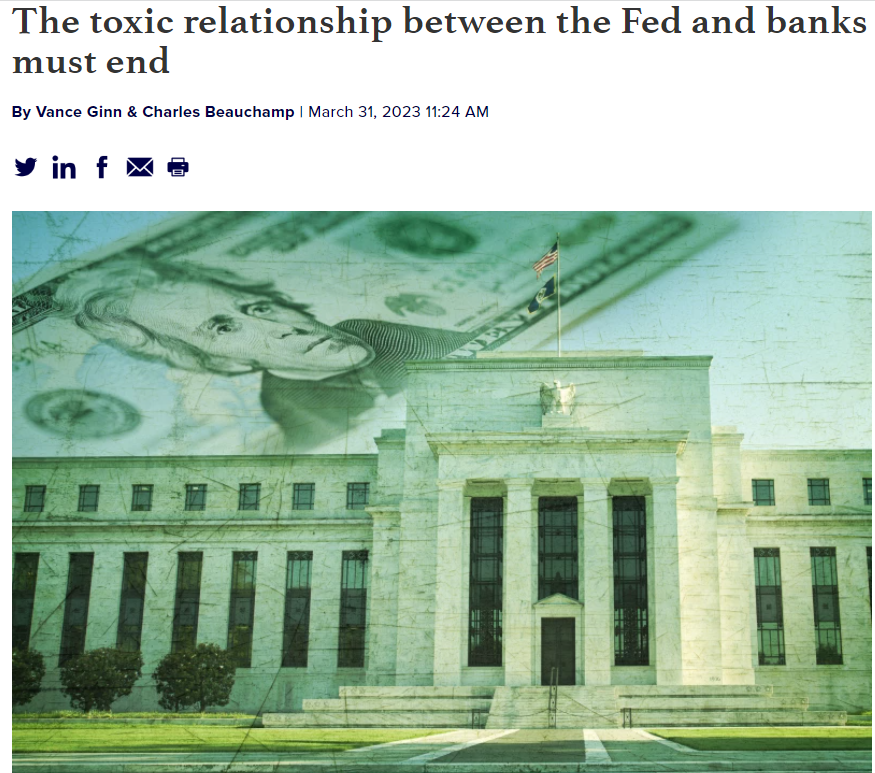|
In co-dependent relationships, there’s often an enabler compounding the destructive behavior. In the case of the Silicon Valley Bank collapse and a possible crisis for the banking industry, the Federal Reserve and its fast-and-loose monetary policy is that toxic enabler. If only couples counseling could fix the muddled relationship between the Fed and the banking industry.
Over the past three years, the Fed has monetized much of Congress’s excessive deficit spending, thereby bringing inflation to a 40-year high and distorting the banking industry and economy. To take advantage of that extra liquidity, SVB (and many other banks) invested in riskier assets: interest-rate-sensitive bonds. Banks were unprepared for the Fed’s sudden pivot last year when it began increasing interest rates in an effort to control elevated inflation. To be sure, they ignored many warning signs, such as a bloated Fed balance sheet and supply chain disruptions. And when the Fed raised its target federal funds rate from near 0% to today’s range of 4.75% to 5%, bonds began losing significant value. In SVB’s case, the bank had to realize huge losses when it made its mark-to-market calculations for its balance sheet, as it shifted investments from hold-to-maturity to available-for-sale status, hoping to satisfy its depositors by selling those assets. The losses proved too substantial, rendering the bank insolvent. The actions of the Fed certainly incentivized the kind of risk-taking that led to SVB’s insolvency and failure, but the bank was far from an innocent victim as it abandoned basic risk management. It loaded its balance sheet with risky investments while prioritizing social agendas over profits, investing in ESG initiatives that performed poorly. At the time of its failure, SVB looked more like a hedge fund than a commercial bank. But instead of letting SVB and its depositors face the consequences of the bank’s mismanagement, the Federal Deposit Insurance Corporation, Federal Reserve, Department of Treasury, and White House launched coordinated rescue actions, determining that all depositors of the failed bank would be saved. The FDIC’s traditional policy of insuring accounts up to $250,000 was seemingly obliterated by this decision, establishing an entirely new regime. The Fed and FDIC justified the SVB rescue by claiming that the bank represented a “systemic risk” though it was only a mid-level-sized bank. This further muddied the waters as to how the Fed and FDIC determine which institutions are “too big to fail.” Further compounding the issue was Treasury Secretary Janet Yellen’s testimony to the Senate Finance Committee guaranteeing all deposits of “Too Big to Fail” banks. The fallout from this new regime, which focuses only on the deposits of the largest banks, creates an incentive for depositors with more than $250,000 to shift their deposits to the largest banks that will accept them. This will put pressure on mid-level and smaller banks as they must now compete for larger deposits that will be uninsured at their banks. The result of this challenge will likely be more consolidation across the banking sector, thus making the big banks that much larger. In a sane society, troubled banks such as SVB would be allowed to fail, and the depositors would lose their deposits above the $250,000 insured amount. But financial socialism is growing. Profits are privatized, losses are socialized, and everyone in government is tripping over each other to bail someone out. The current rescue actions and the promise of more are not a part of the free market capitalism that has supported wealth and prosperity throughout America’s history. These actions send a loud and clear signal to all banks: go ahead and take the risk! We’ll finance your failure with a more accommodative monetary policy. It should come as no surprise when more banks begin backsliding due to this messaging. As things stand, no sector, including the banking industry, is incentivized via market discipline to reduce risky behaviors thanks to the government’s outsize role. The ones who suffer most from this are consumers seeking services, who will inevitably be left with more mediocre options as government handouts cover competition. To avoid this and strengthen the economy, Washington needs to end bailouts. The Fed needs to keep raising its target federal funds rate and more aggressively reduce its bloated balance sheet, which it increased by $300 billion recently, to rein in inflation and let markets work. Likewise, Congress should cut spending to stop issuing so many Treasury securities that fund the more than $31 trillion national debt. This system where the Fed micromanages the free market instead of allowing the free market to work out problems on its own will continue to impoverish the economy. Indeed, Fed Chairman Jerome Powell’s suggestion last week that target rate hiking is nearing an end means Americans can expect more inflation and more economic distortions for a longer period of time. The recent events provide further evidence that it is past time to reevaluate the structure, governance, and operating rules of the Fed. Indeed, Washington’s response to the SVB failure proves the entire financial arm of the government ought to be thoroughly reformed so that market discipline can be returned to the banking sector. If significant change doesn’t happen, the troubled co-dependent relationship between the banking sector, the Fed, and Washington’s bureaucracy will never heal. For Americans, that means waiting on the next Fed-fueled boom and bust cycle. Originally published at the Washington Examiner.
0 Comments
Leave a Reply. |
Vance Ginn, Ph.D.
|


 RSS Feed
RSS Feed